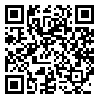Volume 9, Issue 1 (8-2009)
Iranian Journal of Medical Education 2009, 9(1): 69-78 |
Back to browse issues page
Download citation:
BibTeX | RIS | EndNote | Medlars | ProCite | Reference Manager | RefWorks
Send citation to:



BibTeX | RIS | EndNote | Medlars | ProCite | Reference Manager | RefWorks
Send citation to:
Laluei A, Kashanizadeh N, Teymouri M. The Influence Of Academic Educations On Choosing Preferable Delivery Method In Obstetrics Medical Team: Investigating Their Viewpoints. Iranian Journal of Medical Education 2009; 9 (1) :69-78
URL: http://ijme.mui.ac.ir/article-1-933-en.html
URL: http://ijme.mui.ac.ir/article-1-933-en.html
, mojtaba_teimoori@yahoo.com
Abstract: (15962 Views)
Introduction: The prevalence of cesarean section in our country is growing. Our aim was to investigate the education and attitudes of obstetrics team toward the preferable delivery method in some selected educational hospitals in Tehran. Methods: The population under investigation in this descriptive cross-sectional study was a group of interns, gynecology residents, obstetricians, midwifery students, and midwives working in delivery wards of Baqiatollah, Najimeh, Shariati, Imam Khomeini, and Bouali hospitals in Tehran. The questionnaire included patients' demographic data, individuals’ attitudes toward delivery methods and their willingness to cesarean section, their knowledge about delivery methods, and their satisfaction with the education they received during academic years. Data was analyzed by SPSS software using Chi², Fisher exact test, ANOVA, and Mann Whitney. Results: Fifty two cases of cesarean out of total 103 deliveries, provides an approximate rate of 50.5% cesarean among the medical population. The amount of education received during academic period was reported as perfect and comprehensive by 17.7% of them and 26.4% mentioned normal delivery as a better method for delivery. Conclusion: The increase in the willingness of medical society toward cesarean section compared to other countries in an unbelievable manner, counts for their poor level of knowledge about benefits and deficiencies of cesarean as well as the dissatisfaction of students and graduates of medical disciplines with received educations. Medical and midwifery education administrators should regard this matter seriously.
Keywords: Knowledge, Attitude, Qualification of academic education, Influencing factors, Cesarean delivery
Type of Study: Original research article |
Received: 2009/07/7 | Accepted: 2011/08/7 | Published: 2009/08/15 | ePublished: 2009/08/15
Received: 2009/07/7 | Accepted: 2011/08/7 | Published: 2009/08/15 | ePublished: 2009/08/15
Send email to the article author
| Rights and permissions | |
 |
This work is licensed under a Creative Commons Attribution-NonCommercial 4.0 International License. |




